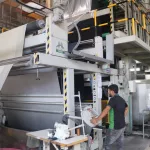 Chennai : Tamilnadu Chief Minister J Jayalalithaa has issued an order to allot Rs 127.40 crore to 15 common effluent treatment plants in Tirupur region.
Chennai : Tamilnadu Chief Minister J Jayalalithaa has issued an order to allot Rs 127.40 crore to 15 common effluent treatment plants in Tirupur region.
It was finally decided that installing latest equipment at dyeing units would address the issue. Hence a policy decision was taken to allot Rs 200 crore as interest-free loan to 20 units (Rs 10 crore each). Following this, the Chief Minister has ordered to release Rs 127.40 crore as credit, the release said. The allocation would help in achieving the zero discharge target, benefiting both farmers and the dyeing units, it said.
It has been decided to adopt either a system followed on experimental basis at Arulpuram Tamil Nadu Water Investment Corporation Limited or a Nano effluent treatment system being followed in Gujarat, it added, expressing hope that the decision would make thousands of employees in the dyeing units, farmers in Tirupur region and their family members happy.
According to an official release here, the wastes let out from 754 dyeing units and 20 common effluent treatment plants mixed with Noyyal river and other water bodies meant for irrigation. Hence, based on a case filed by the farmers’ federation, the High Court ordered setting up of common effluent treatment plants in 1998.
However, the problem persisted even after that, the release said and listed out various legal notifications and court verdicts that were given in the issue for the past one decade and more. The public interest litigation against the units was filed way back in 1996 and sought directions from the high court for a pollution-free Noyyal river. The petitioner who filed it said dyeing and bleaching units are discharging industrial effluents into the river, making the water unfit for irrigation and other purposes. Despite several orders for closure from the Madras High Court, no steps were taken, which led to the filing of the present contempt petition, the petitioner said.
The Madras High Court had ordered the closure of all dyeing and bleaching units in Tirupur, which generates a fifth of India’s textile exports. The move affected around 720 units, employing 40,000-50,000 workers, and cause an estimated loss of Rs 50 crore a day.




